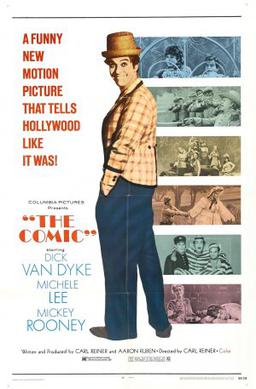The 1969 film, The Comic, details the long and not particularly happy life of silent screen star Billy Bright (played by Dick Van Dyke). Billy Bright tells us his story from beyond the grave. The film opens with his funeral, which is sparsely attended and features the type of self-consciously mawkish eulogies that are usually trotted out whenever a generally unlikable person dies. The only sign of life at the funeral comes when Billy’s oldest friend, Cockeye (Mickey Rooney), throws a pie at one of the speakers. The speaker says that the pie was Billy’s final joke.
Billy Bright was a funny performer but a miserable man. That’s pretty much the entire plot of The Comic. We see the young Billy, performing in silent films and winning laughs through the seemingly impossible contortions through which he puts his body and his face. Off-screen, Billy marries one of his co-stars (Michele Lee) and starts a production company. When she discovers that he’s been cheating on her, their divorce is a major Hollywood scandal.
Even before the coming of the talkies, Billy struggles with alcohol. Once the talkies do come, his career is pretty much over. Billy became a star in silent films and he stubbornly wants to continue to make silent films, despite the fact that there’s no longer an audience for them. Billy quickly goes from being a star to being forgotten. He’s reduced to walking down Hollywood Boulevard with Cockeye and looking at the names under his feet. When he reaches his name, he discovers that someone has dropped their gum on it.
Billy finally does get his comeback in the late 60s but it’s not much of a comeback. He appears on a talk show and it’s hard not to cringe a little as the clearly infirm Billy duplicates some of his silent era pratfalls. He’s reduced to appearing in a rather awkward commercial for a laundry detergent called, I kid you not, White-ee. “That’s White-ee, baby!” his commercial co-star says after a freshly cleaned Billy emerges from a washing machine.
The idea that most funny performers are actually rather serious and depressing off-stage is certainly nothing new. Judd Apatow has basically built an entire career out of making films about how funny people are actually carrying around tons of emotional baggage. The thing distinguishes The Comic from so many other films about angsty comedians is that Billy Bright himself never seems to have a single moment of self-awareness. Usually, films about miserable celebrities will at least have one scene where the main character realizes that his misery is all his fault. Billy Bright is pretty much a jerk from the minute we meet him and he’s still a jerk when the film ends. He’s the type of guy who makes a big deal about picking up his son from school but who still manages to grab the wrong kid because it’s been so long since he’s spent any time with his family that he’s really not sure what his son looks like. Towards the end of the film, we see him watching one of his old films and what we notice is that he doesn’t seem amused at all. Is he thinking about how he lost it all or is it possible that this man who made millions laugh never really had much of sense of humor himself? The film leaves it to you to decide.
The Comic was written and directed by Carl Reiner, who undoubtedly knew quite a few Billy Brights in his life. As such, the film feels authentic in a way that a lot of other films about creative people do not. The Comic is a well-made film. It’s hard not to appreciate the film’s obviously affection for Old Hollywood. That said, Billy Bright is such an unpleasant character that I found the film difficult to enjoy. Van Dyke is genuinely funny whenever he’s doing Billy’s silent film shtick and he’s genuinely tiresome when Billy’s ego gets out of control. It’s a good performance as a generally unlikable character. How you react to The Comic will probably depend on how much sympathy you can summon up for a character who doesn’t really seem to deserve any.
